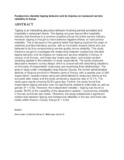Foodservice clientele tipping behavior and its impetus on restaurant service reliability in Kenya
Date
2020-10-19Author
Were, Simon O
Miricho, Moses N.
Maranga, Vincent N.
Metadata
Show full item recordAbstract
Tipping is an interesting pecuniary behavior involving service providers and hospitality’s restaurant clients. The tipping act goes beyond the hospitality industry and therefore is a common practice across the entire service industry. However, tipping is thought to have adverse negative effects on food service reliability. This is because of the general belief that tipping could be the origin of selective and discriminatory service, with an inclination toward clients who are believed to tip thus compromising service quality hence reliability. This study therefore sought to investigate the relationship between foodservice clientele tipping behavior and its impetus on restaurant service reliability in Kenya. A census of all the two- and three-star hotels was taken, and simple random sampling applied in the selection of study respondents. The study employed descriptive research survey design which is concerned with describing situations on the basis of respondents’ responses and examining their relationships. The area of study under investigation was Kisumu County, the former administrative districts of Nyanza province in Western parts of Kenya, with a sample size of 384 respondents. Questionnaires were self-administered to restaurant clients at the exit point after meals and the study achieved a response rate of 72.1%. The study gave results showing 62.8% gave tips. Further, the study found that respondents tipping behavior was not significantly related to nationality as well as gender (P ˃ 0.05). However, the independent variable – tipping was found to explain 30.5% of the variability of the dependent variable – food service reliability in the two and three-star hotels. Therefore, the study established a significant relationship between tipping and foodservice reliability in the two and there star hotels within Kisumu County, Kenya (P ˂ 0.05).
URI
https://doi.org/10.1080/15378020.2020.1834058https://www.tandfonline.com/doi/full/10.1080/15378020.2020.1834058
http://r-library.mmust.ac.ke/123456789/1540
Collections
- Gold Collection [985]

